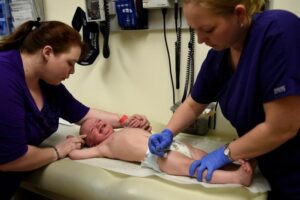Substantial psychiatric and neurological morbidities persisted among many for 6 months following a SARS-CoV-2 infection, especially among those who were severely ill. These findings, from a retrospective cohort study, were published in Lancet Psychiatry.
Researchers from University of Oxford analyzed data from The TriNetX Analytics Network which included electronic health records from 81 million patients, primarily collected in the United States. Patients (n=236,379) with a confirmed COVID-19 diagnosis and 2 propensity matched control cohorts of patients with another respiratory tract infection (n=236,038) and influenza (n=105,579) were assessed for 24 psychiatric and neurological conditions at up to 180 days.
Patients with COVID-19 were aged mean 46 (standard deviation [SD], 19.7) years, 55.6% were women, and 57.2% were White. Most patients were not admitted to the hospital (n=190,077), 46,302 were admitted to the standard care hospital unit, 8945 were admitted to the intensive care unit (ICU), and 6229 had encephalopathy.
Continue Reading
At 6 months psychiatric and neurological outcomes were observed among 33.62% (95% CI, 33.17%-34.07%) of patients with COVID-19. The patients who were admitted to the ICU (46.42%; 95% CI, 44.78%-48.09%) or had encephalopathy (62.34%; 95% CI, 60.14%-64.55%) had increased rates for psychiatric and neurological outcomes.
Compared with other respiratory tract infections, patients who had COVID-19 were at increased risk for developing all psychiatric and neurological outcomes except substance use disorder, with a more than 2-fold higher risk for myoneural junction or muscle disease (hazard ratio [HR], 4.52; 95% CI, 1.42-1.55; P <.0001 and guillain barr syndrome ci>P <.0001>
Compared with influenza, patients who had SARS-CoV-2 were at increased risk for developing all outcomes except Guillain Barré syndrome and Parkinsonism. The patients with COVID-19 had a more than 2-fold increased risk for myoneural junction or muscle disease (HR, 5.28; 95% CI, 3.71-7.53; P <.0001 first intracranial hemorrhage ci>P <.0001 any intracranial hemorrhage ci>P <.0001 dementia ci>P <.0001 first psychotic disorder ci>P <.0001 and any psychotic disorder ci>P <.0001>
Among patients with COVID-19, those who were admitted to the ICU had increased risk for many of the psychiatric and neurological outcomes, especially myoneural junction or muscle disease (HR, 11.53; 95% CI, 6.38-20.83; P <.0001 and guillain barr syndrome ci>P =.0007). Similarly, compared with patients who were not hospitalized for COVID-19, hospitalization increased risk for the majority of conditions, particularly myoneural junction or muscle disease (HR, 7.76; 95% CI, 5.15-11.69; P <.0001>
This study may have been limited by the scarce data on family history of psychiatric and neurological conditions, and there was no accounting for predisposition.
These data indicated at 6-months, psychiatric and neurological sequelae persisted among a third of individuals with COVID-19 and this rate increased among patients who were hospitalized or transferred to the ICU.

We spoke with Jonathan Rogers, MD who wrote a comment article (A longer look at COVID-19 and neuropsychiatric outcomes) about the study published April 6, 2021 in Lancet Psychiatry. Dr Rogers of the Division of Psychiatry at University College London, also works at the Maudsley NHS Foundation Trust, London, UK.
According to Dr Rogers, “Research on the neuropsychiatric outcomes of COVID-19 has progressed from single case reports in the early stages of the pandemic to case series and then more robust epidemiological studies. This study using real-world data from the electronic health care records of more than 80 million individuals represents the next stage in COVID-19 research. It allows us to see the potential for COVID-19 to associate with neuropsychiatric symptoms not only during infection but in the subsequent months.
The good news is that some of the concerns in the early pandemic of high rates of Guillain-Barré syndrome or a resurgence of encephalitis lethargica have not been borne out so far. However, this research does suggest that COVID-19 is associated with high rates of common mental disorders in its aftermath. It also suggests an association with new-onset psychosis and dementia, which is very concerning due to the longitudinal course of these disorders.
Now that we have identified the neuropsychiatric risks of COVID-19 infection, research needs to mobilize quickly to develop trials of pharmacological and psychological treatments.”
References
Taquet M, Geddes JR, Husain M, Luciano S, Harrison PJ. 6-month neurological and psychiatric outcomes in 236 379 survivors of COVID-19: a retrospective cohort study using electronic health records. Lancet Psychiatry. Published online April 6, 2021. doi:10.1016/ S2215-0366(21)00084-5.
Rogers JP, David AS. A longer look at COVID-19 and neuropsychiatric outcomes. Lancet Psychiatry. Published online April 6, 2021. doi:10.1016/S2215-0366(21)00120-6
This article originally appeared on Psychiatry Advisor





